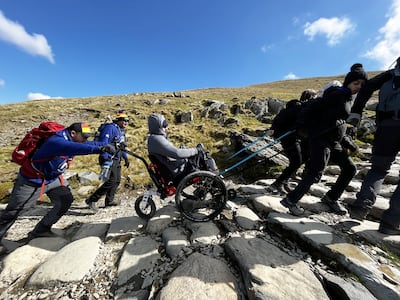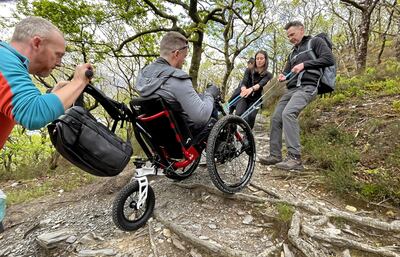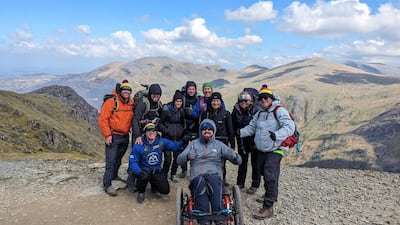A man paralysed by the Manchester Arena bombing in 2017 has conquered the summit of Africa’s highest mountain in his wheelchair.
Martin Hibbert, 45, launched the mission to get to the top of Mount Kilimanjaro because he wanted to “move mountains” for disabled people.
He has already raised around half of the £1 million ($1.21m) target for the Spinal Injuries Association.
Mr Hibbert, from Chorley in Lancashire, and his daughter Eve, then aged 14, were six metres away from suicide bomber Salman Abedi five years ago last month.
Mr Hibbert's spinal cord was severed by the bombing that killed 22 people and injured more than 1,000.
He reached the top of Mount Kilimanjaro this week with a team of helpers, plus local guides and porters.
They broke into song and dance when they reached the top of the 5,685 metre high snow-capped mountain in Tanzania.
“I could just see the sign at the top. I didn’t know whether to laugh, cry … it was such a relief to get there and know that we had done it. Something I will always remember. Just so proud,” Mr Hibbert said.
“I said we will all come back as different people and I certainly will do, just the love and that. I’m definitely a different person going home and I think everyone else will be as well.
“You know it doesn’t stop here. We’ve climbed a mountain but we now need to move mountains to get what we need in terms of social care change, changes in accessibility, things like that, so I’m going to need all these people to continue giving me that love and support,” he said.

“That’s why I’m doing this to show [you] don’t write off somebody because they’re in a wheelchair. Look at what they can do when they’ve got the right help and support, they can climb Mount Kilimanjaro.
“Hopefully, doing this has highlighted just how important help and support is.”
At the summit, Mr Hibbert spread some of his mother’s ashes. She died last year.
“I said she was going to be with me. Love you, Mum,” he said.

Nik Hartley, chief executive of the Spinal Injuries Association, told BBC Breakfast: “It’s important to understand, there’s the physical feat of going up a mountain.
“But this isn’t a disabled man goes up a mountain with a wheelchair, this is a man [who] says, I’m coming out of something terrible and I’m going to do something that can change the lives of people who can’t even leave their bedrooms because of a spinal chord injury.
“It’s incredible, it’s about mental as well as physical [strength].”


